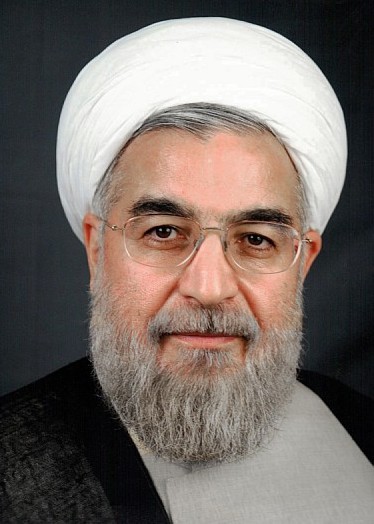Assuming you're not a shareholder of Boeing or a customer of Iran Air, it might not be immediately clear why this is big news. And in an ideal world, it wouldn't be. US companies would be able to trade freely with Iranian companies, and every new business deal would be entirely mundane. In the world we actually live in, however, this deal is nothing short of groundbreaking. It has major implications in both practical and symbolic ways.
Practical Implications
Starting first with the practical effects, Iran has been suffering under US and/or international sanctions to some extent
dating back to 1979,* shortly after the Iranian Revolution overthrew the US-backed dictator there. Since that time, each successive US president, save George Bush Sr., has managed to tighten the sanctions regime. Despite failing to
produce any positive political effects, the sanctions regime has had many negative effects for the Iranian economy over the years. One of the more acute, and obscure, consequences came from Iranian companies' inability to import new civilian airplanes or import spare parts to maintain their existing fleet. The result is that Iran's commercial aircraft are considerably less reliable and safe, on average, than the rest of the world's.
While very specific, this problem makes perfect sense from an economic perspective. Airplanes represent a very complex and specialized product, as well as a considerable amount of capital. There's no reason that an Iranian entrepreneur couldn't start an airplane or spare parts manufacturing business. But their ability to be successful in a such a specialized industry is limited by the size of the market.
An Economics Tangent
To see a more tangible example of this principle at work, think of the rise of specialty online retailers. And in particular, we'll use the not-entirely-random case of vegan shoes. Before the Internet and e-commerce had taken off, there were probably about as many vegans as there are today. And if you're vegan, especially if you're a guy, the prospect of finding a good vegan (non-leather) pair of dress shoes is a daunting one. It basically comes down to a tradeoff between principle and pain. You could buy high-end dress shoes that were fashionable and comfortable, but you'd have to compromise on principle because they would invariably be made of leather. Or you could find cheap dress shoes that were vegan by accident to make them cheap, but these would typically look terrible and feel even worse. I surely was not the only one confronted with this dilemma, and yet, my moderately-sized hometown of Boise, Idaho did not have a single vegan shoe store. It was outrageous, I assure you.
Fortunately, the Internet (and before that, the mail-order catalog to a degree) provided the solution. Because while there were not enough male vegans in Boise in need of professional shoes to support a dedicated store (indeed, I doubt the number was significantly higher than 1), there are more than enough in the world to do so. And thus, we have the rise of successful online vegan shoe stores such as the literally named
Vegetarian-Shoes.co.uk.
Back to Iran
So why did I tell you a long-winded story about the trials of the vegan shoe consumer? Because it actually explains the Iranian airline predicament quite well. When dealing with a very specialized product with limited demand, the size of the market is everything. By preventing other countries from trading with Iran, this is akin to removing the ability of the vegan shoe store to sell online. They might be able to survive, but they won't be able to specialize and refine their product as much as an organization that has the world market as their possible customer base. Combine that with Iran's inability to import products, and the result is that the products that are available probably aren't going to be as good. In this way, reducing the size of the market limits specialization and tends to reduce product quality as well.
Given this backdrop, the entry of Boeing, the largest aircraft manufacturer in the world, into the Iranian market is likely to provide real and meaningful benefits to Iranian travelers. This alone would be great news.
Symbolic Implications
The benefits do not end there however. There's also a major symbolic component. As noted above, Iran and the US have been at odds more or less continuously since 1979. The two countries have been on the brink of war (with the US as the instigator) on multiple occasions, and it is almost a miracle that a direct full-scale conflict never erupted.
This is important context because Boeing isn't just a major aircraft manufacturer. They are also one of the US's largest defense contractors. This means that one of the principal members of the US military-industrial-complex is now engaging in a peaceful mutually beneficial trade with a nation that was a principal member on the US hit list until very recently. The US Government may have refused to fully normalize relations or fully lift sanctions on Iran. But Boeing is not waiting for the dust to settle. This deal represents a kind of private detente, one that may prove to be nearly as significant as the Iran Deal was in moving the ball towards normalcy.
Incentives Aligned with Peace and Trade
It should go without saying that Boeing did not pursue this deal out of the goodness of their heart. Instead, this is about the bottom line, and that's perfectly okay.
It should also be noted that, historically, Boeing is not shy about influencing the political process when it benefits the bottom line. This was seen most recently when it lobbied successfully for preserving that great archetype of corporate welfare, the Export-Import Bank. But influencing the government comes hand-in-hand with being a defense contractor. No individual or group in US society has much use for combat helicopters or other high-tech weapons. So if they are going to find a buyer, it will necessarily be through well-coordinated lobbying of the purchasers. This may explain why in the 2014 election cycle, Boeing was the 11th most prolific lobbying organization (based on dollars spent) in the US, according to
OpenSecrets.org.
And as a defense contractor, it often makes business sense for Boeing to support war and hostilities around the globe. Rising tensions increase the perceived need for more weapons and military equipment, and war itself necessitates the replenishment of ammunition and equipment. From a financial perspective, these are great things for Boeing.
In this case, however, the tables have turned. Boeing has made the calculation that the potential profits from gaining Iranian airlines as new civilian aircraft customers are larger than the profits associated with an outright conflict or just continuing tensions in the region. The fact that Boeing pursued and announced this deal publicly, even before some of the details are final, proves that they have committed to this decision.
This is critical, because there will definitely be efforts to try to shut it down. Already,
members of Congress have weighed in suggesting that this deal somehow represents a threat to US national security if Iran replaces old
civilian airplanes with new, American-made ones. There are also still residual obstacles to the deal emerging from Obama's
failure to honestly implement sanctions relief. Currently, Iran is still effectively denied access to the international payments system, so it's unclear how they would pay for the $25 billion deal. This has made some skeptical that the deal will actually stick.
My view, however, is that the sale will stand. This deal represents an opportunity for Boeing to earn more revenue from one customer
than the whole company did in the first quarter of this year. Boeing has a very strong vested interest in seeing this transaction through. And their extensive lobbying power means they will almost certainly be able to eliminate any existing political obstacles in their path. If Boeing's lobbying organization can save the Export-Import Bank, which
has no legitimate arguments supporting it, then surely it can also ram through a business deal that has no legitimate arguments opposing it. Hopefully, in the process, they'll eliminate the obstacles for other countries and companies to trade with Iran as well. In short, Boeing's profit-driven self-interest may be able to provide relief that President Obama promised but refused to provide himself.
Time will tell how all the details shake out on this story. But for now, we can sit back and enjoy the beautiful spectacle. A defense contractor is lobbying for peace and trade with Iran--and they are going to win.
*Disclaimer: This link portrays US actions in a much more positive light than is warranted, but it still summarizes some of the key events.


